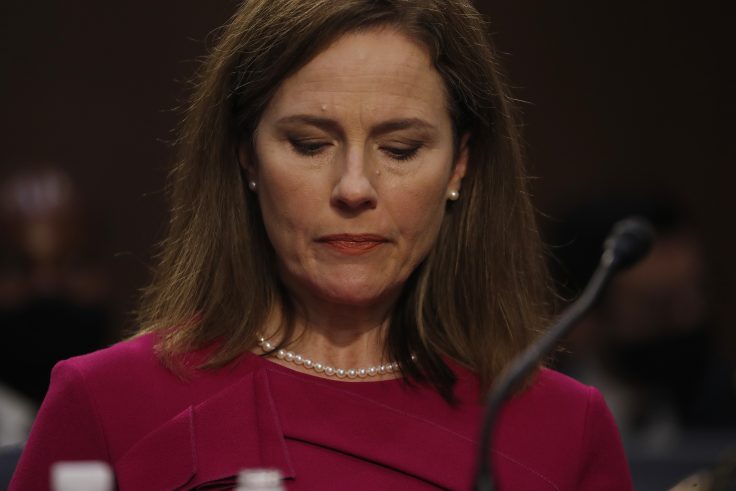Supreme Court nominee Amy Coney Barrett's confirmation may elevate a critic of Chief Justice John Roberts to the High Court.
Democrats are concentrating on Barrett's apparent criticisms of Roberts's Affordable Care Act opinions ahead of her confirmation hearings, which begin Monday. Yet Barrett's scholarly writings hint at a much deeper disagreement with the chief justice's stewardship of the Court. In a pair of law review articles, she questioned whether judges can effectively protect the legitimacy of the courts by deciding cases with an eye toward public confidence.
Though Roberts is never mentioned by name, her critiques straightforwardly apply to the man whose career on the Court is most defined by reputation-burnishing.
The articles portend the challenges awaiting the chief justice should Barrett join the Court. Anthony Kennedy's retirement momentarily made Roberts the most powerful chief justice of modern times. He holds together the fifth vote in divisive cases, the right to assign majority opinions, and the power to set the terms of practically every consequential decision. In Barrett, he may soon have a colleague whose written record seeds doubts about the equilibrium he has carefully curated for years.
The Supreme Court will hear another constitutional challenge to the ACA on Nov. 10. Senate Democrats are casting Barrett as an opponent of the law, based on her remarks in a 2016 review of a libertarian law professor's book. Barrett cited a 2015 Roberts opinion about the ACA as a "creative" example of a case in which the chief justice ignored the plain text of the law in favor of a restrained approach that respects Congress's intent and ducks hard questions. That kind of decision-making, she wrote, is at odds with textualism and originalism, the legal approaches to which she openly subscribes.
"For Justice Scalia and those who share his commitment to uphold text, the measure of a court is its fair-minded application of the rule of law, which means going where the law leads," Barrett's review reads. "By this measure, it is illegitimate for the Court to distort either the Constitution or a statute to achieve what it deems a preferable result."
In another section of the review, Barrett wrote that Roberts "pushed the Affordable Care Act beyond its plausible meaning" when he upheld the mandate to buy health insurance on tax grounds, though it's unclear whether she was referring to the book's argument or her own.
Barrett has explored judicial legitimacy in other scholarly pieces. In a 2013 article in the Texas Law Review about the power of precedent, she appeared to reject arguments that judges should stick with past decisions to protect public confidence in the courts. That kind of reputation-conscious approach is often attributed to the chief justice. Barrett seems to find it patronizing.
"The 'protecting public confidence' argument seems to assume that the public would be shaken to learn that a justice's judicial philosophy can affect the way she decides a case and that justices do not all share the same judicial philosophy," Barrett wrote. "This, however, is not news to the citizenry."
"That Americans—and thus Supreme Court justices—disagree about how to interpret the Constitution is a fact of our political culture," she added.
The Court's actual legitimacy, Barrett said, turns on honest consideration of the arguments for and against overturning a past decision. That means giving precedent significant deference but not reflexive obedience.
"Basic confidence in the Supreme Court requires the assumption that, as a general matter, justices decide cases based on their honestly held beliefs about how the Constitution should be interpreted," Barrett wrote. Noting that controversy over past Supreme Court decisions has never abated, she added that the public itself does not seem to believe precedent can "declare a permanent victor" in constitutional disputes.
Whatever her criticisms, it doesn't seem likely that Barrett would needle Roberts as her mentor occasionally did. Neither her scholarly writings nor her judicial opinions reflect the piquant style of Antonin Scalia, for whom she clerked in 1998. And she will sound distinctly collegial notes in her opening statement to the Senate Judiciary Committee.
"If confirmed, it would be the honor of a lifetime to serve alongside the chief justice and seven associate justices," her statement reads. "I admire them all and would consider each a valued colleague."
